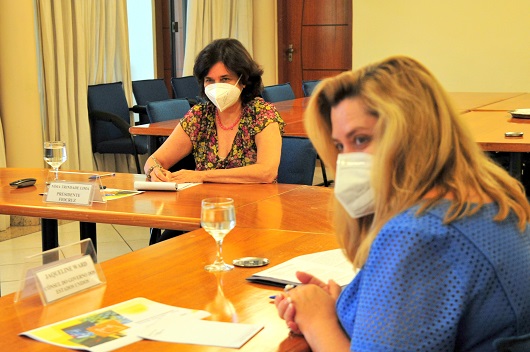US Consul in Rio visits Fiocruz and talks about cooperation
23/12/2021
Cristina Azevedo (Fiocruz News Agency)
The ties between Fiocruz and the United States Consulate in Rio de Janeiro should become closer next year. On 12/16, the consul Jacqueline Ward and the president of Fiocruz, Nísia Trindade Lima, met at the Official Residence. On the agenda, scientific cooperation between Brazilian and American institutions, the XVI National Malaria Research Meeting and a parallel symposium organized by the Foundation and the National Institute of Allergy and Infectious Diseases/National Institutes of Health of the United States (NIAID-NIH), with the international experts' participation, such as Anthony Fauci, the main American epidemiologist and country's task force leader against COVID-19.
Nisia and Jacqueline Ward talked about scientific cooperation (Image: Pedro Paulo Gonçalves)
In office since August, Jacqueline Ward was previously an Economic Affairs Advisor in Bogotá, Colombia, and a senior advisor for International Communications Policy in the State Department's Economic Office. At Fiocruz, she was accompanied by Jesse Levinson, head of the consulate's Political and Economic Sector, and Gabrielle Moseley, responsible for Economic Affairs.
"I wanted to learn about the work of Fiocruz and see how to collaborate in the future. Let's start the year with new energy and expanding contacts," said the consul, who also showed interest in learning more about the Foundation's partnerships with non-governmental organizations.
Nísia, in turn, showed interest in strengthening cooperation with American institutions, adding that the demand of US students for courses at the Foundation has grown. She also highlighted the Fiocruz role in Global Health: "More and more, the Foundation acts in health diplomacy and strengthens the role of Science and Technology, both in the North/South level, and in the South/North/South triangular level", said the president.
The Education, Information and Communication vice president, Cristiani Machado, and the Editora Fiocruz scientific editor, Gilberto Hochman, noted that some students sometimes face difficulties with documentation to study in the US. In response, the consul suggested scheduling a presentation on the subject, in addition to recalling the organization Education in USA existence, which helps Brazilians who want to study in the United States.
Malaria and emerging threats on the agenda
After Pedro Burger, assistant coordinator of the Fiocruz Global Health Center (CRIS/Fiocruz), showed a map of the Foundation's agreements with American institutions, Cristiani and Gilberto also remembered that many of these partnerships are not institutionalized. From contacts between researchers from both countries, for example, the idea of a side event to the malaria congress was born. The XVI National Meeting of Malaria Research will take place from April 25 to 28, 2022. But before that, from April 23-25, the international symposium Emerging and Persistent Global Health Threats (co-organized and co-funded by Fiocruz and NIAID-NIH) will take place. The symposium will address topics such as COVID-19, HIV, arboviruses, environment and epidemics, malaria, among others. The 23rd will be dedicated to a workshop on grant writing and submission to the NIH. On the 24th and 25th, the symposium itself will take place, with almost 60 speakers participating. Among them, Fauci, director of the NIAID, and Adrian Hill, director of the Jenner Institute at Oxford University, responsible for AstraZeneca's COVID-19 vaccine (manufactured in Brazil by Fiocruz) and the R21/MM malaria vaccine.
The congress is held every two years, and its date coincides with April 25th, designated in 2007 by the World Health Organization (WHO) as International Malaria Day. The original idea was to hold a parallel Fiocruz-NIH symposium to celebrate the Foundation's 120th anniversary. But the meeting was postponed due to the pandemic, and the symposium grew.
"It evolved into something bigger. It broadened the spectrum of the event to emerging global health problems. And, with COVID, it gained even more relevance," said Leonardo José de Moura Carvalho, a researcher at the Oswaldo Cruz Institute's (IOC) Malaria Laboratory. Carvalho organizes the event on behalf of Fiocruz, together with Hans Ackerman, from NIAID-NIH. "This Fiocruz-NIH association culminated in a Brazil-USA association. We have broadened the focus of the approach, even to bring other groups and institutions", added the researcher.




